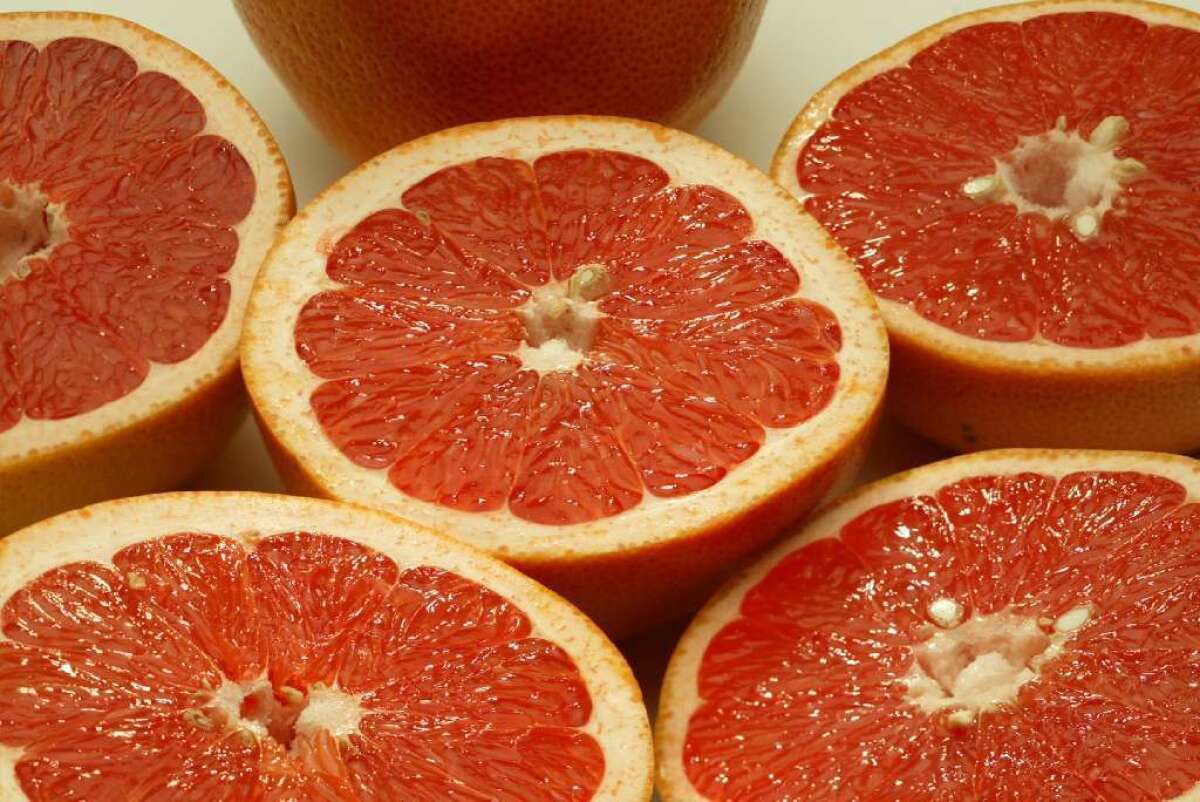Slim down with grapefruit juice? Berkeley study adds weight to idea

- Share via
The next time you go out for cheeseburgers and fries or pepperoni pizza, you might want to consider washing it down with a glass of grapefruit juice.
A new study from UC Berkeley researchers found that mice who drank their fill of sweetened grapefruit juice gained less weight on a high-fat diet than their counterparts who drank sweetened water. The juice-drinking mice also had better measures of metabolic health, including blood sugar levels and insulin sensitivity.
Grapefruit juice did not affect weight gain or loss for mice who were eating a low-fat diet, the researchers found. But it did make their bodies more sensitive to insulin.
The results of the study were published Wednesday by the journal PLOS ONE.
The findings come with several caveats. For starters, the study was paid for by the California Grapefruit Growers Cooperative. But the Berkeley researchers, from the university’s Department of Nutritional Sciences and Toxicology, insisted that they went into the study with plenty of skepticism about the dietary power of grapefruits.
“I was surprised by the findings,” Andreas Stahl, the study’s senior author, said in a statement from the university. “We even re-checked the calibration of our glucose sensors, and we got the same results over and over again.”
Also, the study was small, with each combination of diet, liquid and other nutrients tested in groups of just six mice.
And of course, what happens in mice won’t necessarily happen in people.
Still, the results may help explain why grapefruits are frequently featured in fad diets.
Mice don’t care for the bitter taste of grapefruit juice, which comes from a flavonoid called naringin. In previous studies of mice that slimmed down when given grapefruit juice instead of water, their weight loss could have been due to the fact that the bitterness caused them to lose their appetites.
The Berkeley researchers hoped to solve this problem by doing two things. First, they sweetend the pulp-free grapefruit juice (made from California Ruby Red grapefruits) with saccharin. Second, they gave mice in the control group sugar water made with glucose and saccharin that had the same amount of calories as the sweetened juice.
In the experiments, mice offered grapefruit juice and water drank similar amounts. (They also ate similar amounts of food.)
After eating high-fat chow for 100 days, the mice who drank grapefruit juice weighed 18.4% less than the mice who drank the sweetened water. The difference in body weight started to become apparent within 15 days, and the gap was large enough to be statistically significant by day 78, according to the study.
At the end of the 100 days, the mice who drank juice were in better metabolic health than the ones who drank the same amount of calories in the form of sugar water. They had lower fasting blood sugar levels, better insulin sensitivity, and lower levels of triglycerides in their livers.
In a follow-up experiment, the researchers allowed the mice to become obese before they introduced the grapefruit juice. After 55 days, the mice who drank grapefruit juice weighed 8% less than the mice who drank water, and they also showed signs of better metabolic function.
Then the researchers compared the effects of grapefruit juice with the grapefruit flavonoid naringin and the diabetes drug metformin. All three “treatments” reduced the mice’s blood sugar compared with drinking sugar water. But only the juice drinkers saw any benefit on the scale – after 106 days, they weighed 14% less than mice in the other groups.
It’s not exactly clear why grapefruit juice would promote weight loss, especially since the active ingredient – naringin – didn’t have the same effect. However, the researchers noted that mice that drank juice had reduced expression of a protein involved in regulating metabolism, so perhaps something in grapefruit changes the way the body makes or stores fat.
The researchers also warned that grapefruit and grapefruit juice may interfere with the body’s ability to metabolize certain drugs. This list includes some kinds of drugs taken to control cholesterol, blood pressure, heart arrhythmia, allergies and anxiety, according to the Food and Drug Administration. The problem is serious enough that scientists are trying to create a hybrid grapefruit that would be safe to take with medications, this FDA video says.
For more medical news, follow me on Twitter @LATkarenkaplan and “like” Los Angeles Times Science & Health on Facebook.



